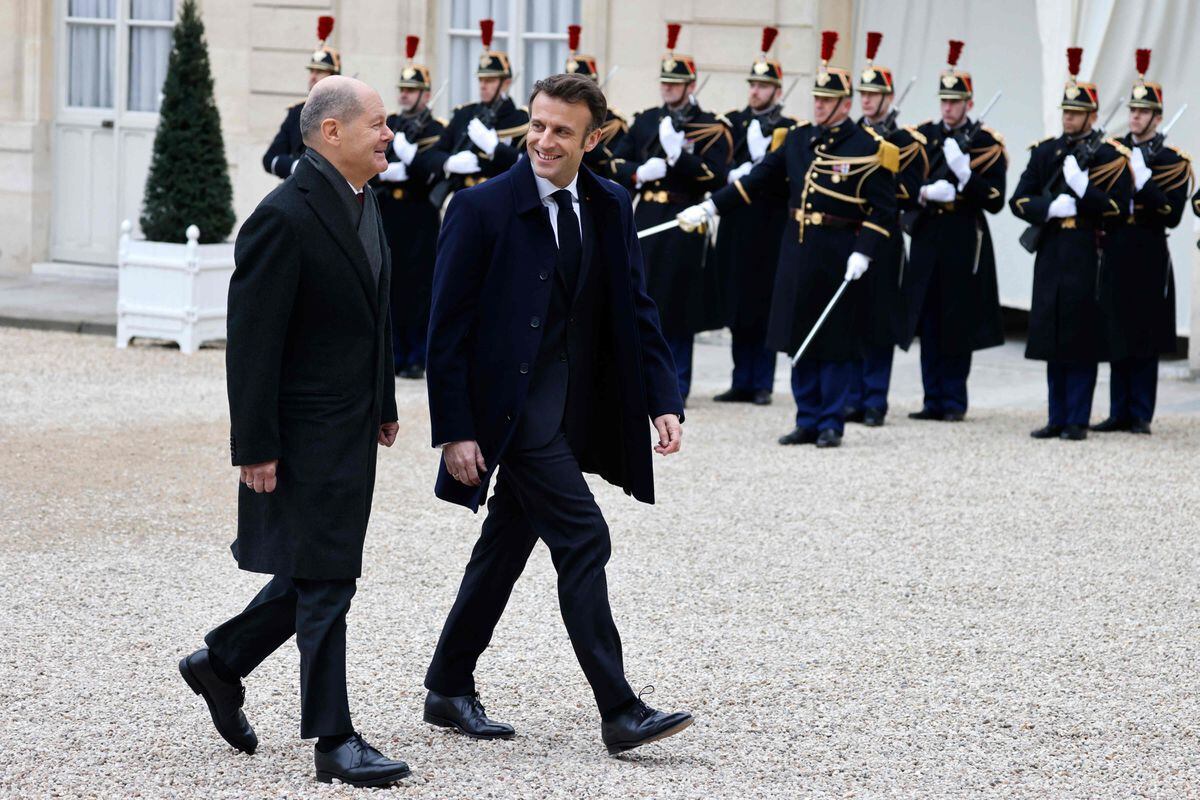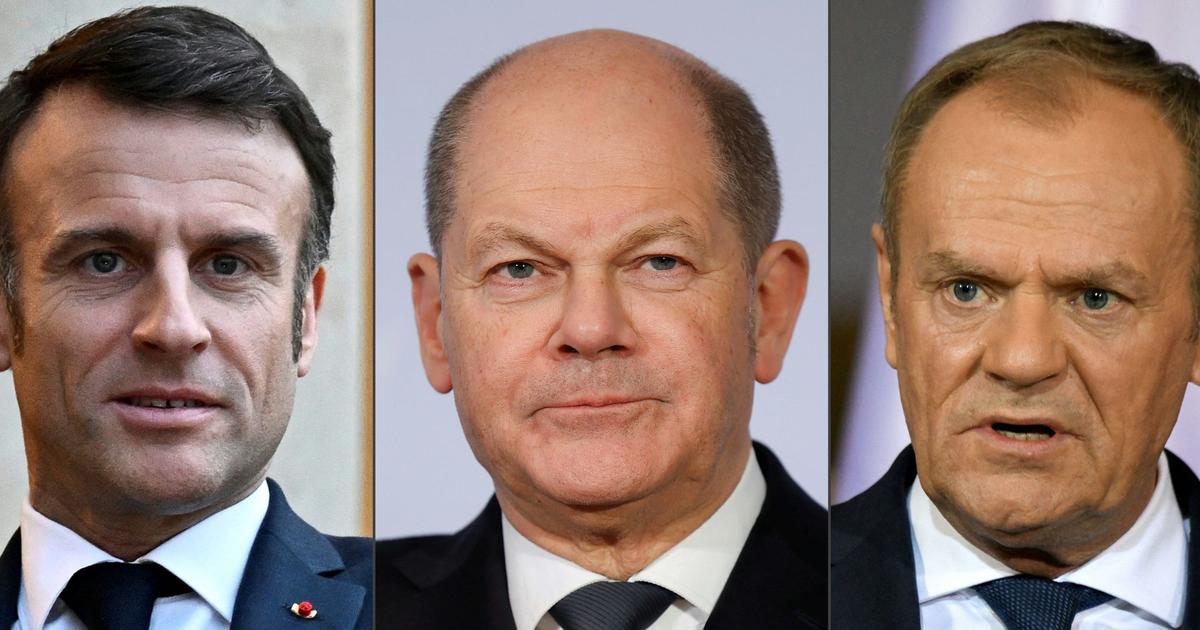France and Germany pledged on Sunday to increase military aid to Ukraine for as long as necessary, but made the shipment of Western-made tanks conditional on an agreement with the United States and its allies.
French President Emmanuel Macron announced at a press conference in Paris together with Chancellor Scholz that he "does not rule out" handing over powerful Leclerc tanks to the Ukrainian army.
Macron's availability increases the pressure on Scholz to send the German Leopard tanks, kyiv's main requirement.
German Foreign Minister Annalena Baerbock opened the door for Poland to provide the Leopards to Ukraine last night in an interview on French television channel LCI.
"At the moment that issue has not been raised," Baerbock said, but "if it were raised, we would not oppose it," said the minister.
In the final communiqué of the Franco-German summit, both leaders proclaim their "unwavering" support for Ukraine.
At the press conference, the German chancellor added: "Unfortunately, I am afraid that this war will last for a long time, and Ukraine must know that we will not lower our guard and will continue to help it."
One of the conditions that both Macron and Scholz set for sending the tanks was that it be done "in close consultation" with the allies.
Germany has indicated that it would not make the decision alone and has expressed the wish that other countries contribute as well.
In addition to the French Leclercs, the debate is whether the US should also supply its own Abrams main battle tanks.
Scholz stated: "In the past we have always acted in close consultation with our allies and friends and we will continue to do so in the future."
Added Macron: "We must do a job in the days and weeks ahead."
Germany wants to avoid taking the decision on the Leopards alone, which Ukraine needs to fight the Russian invasion at this stage of the war.
If France joined this initiative with its Leclercs, it could make it easier for Berlin, under increasing pressure to send the tanks, to make the same decision.
There are about 2,000 Leopard now in various European countries, including Spain or Poland.
What Ukraine and some allies ask of Scholz is that, if he does not directly send tanks from the German Army, he at least authorizes the export of Leopards in the hands of other countries.
That was the path that Minister Baerbock left open in her statements to the LCI channel.
Macron set three conditions to send the Leclercs.
One, that it does not cause an escalation of the war that could end up turning the Western allies into belligerents.
Two, that it supposes a "real and effective" help for Ukraine and, therefore, does not require too long training.
And three, that it does not weaken France's defensive capabilities.
tensions
Macron and Scholz's press conference was held this Sunday in Paris on the occasion of the 60th anniversary of the signing of the Elysée Treaty, by which President Charles de Gaulle and Chancellor Konrad Adenauer sealed Franco-German reconciliation after 75 years of wars.
A treaty that, in the words of De Gaulle, “opened wide the doors of a new future for Germany, for France, for Europe and therefore for the world”.
The objective of this Franco-German summit - the speeches by Macron and Scholz before the parliamentarians of both countries, the joint Council of Ministers in the Élysée, the press conference and the dinner of the leaders - was to repair one of the biggest crises in the relationship bilateral in recent years.
Tensions surfaced when, in October, both made the unusual decision to postpone the joint Council of Ministers that was finally held this Sunday.
The reason for the postponement was a succession of disagreements on economic or military policy, and coordination problems between the two capitals.
A year after the departure of Angela Merkel from the chancellorship, the chemistry between Macron and Scholz did not quite flow.
Given the difficulty in reaching agreements, they judged it preferable to give themselves more time.
substantial discrepancies
Between France and Germany, the differences have been substantial these months.
They are in geostrategic issues and the meaning of what both call a "sovereign" Europe: Germany, more attached to NATO and the US;
France, to the Gaullist tradition of Europe as a mediating and “balancing” power between the great world powers.
There have been differences in energy policy, between a France that continues to bet on nuclear energy and a Germany in the final phase of denuclearization.
The massive green investment plan of the US – the so-called law for the reduction of inflation – harms the competitiveness of the Europeans, who are looking for joint responses.
In Paris, Macron and Scholz defended an "ambitious and rapid" response to US President Joe Biden's plan to ease bureaucracy and public aid controls to reindustrialize Europe with green projects.
The war has changed Europe.
And also Germany, which has broken its energy dependence on Russia and has decided to skyrocket military spending.
As happened in 1989, with the fall of the Berlin Wall, the invasion of Ukraine in 2022 rearranges the European cards and puts the Franco-German engine under stress.
At the same time, it weakens it: the European Union's center of gravity shifts to the east.
And Russia's closest geographical partners believe that time has proved them right regarding Moscow.
While they warned of the danger posed by President Vladimir Putin, Paris and Berlin courted him.
The pressure on France, and especially Germany, to contribute more to the Ukrainian war effort is also understandable in this context: for years they were complacent with Putin, for months they dragged their feet when it came to sending weapons.
Now, facing a decisive phase of the war, they can make a difference.
Follow all the international information on
and
, or in
our weekly newsletter
.
Subscribe to continue reading
Read without limits
Keep reading
I'm already a subscriber















